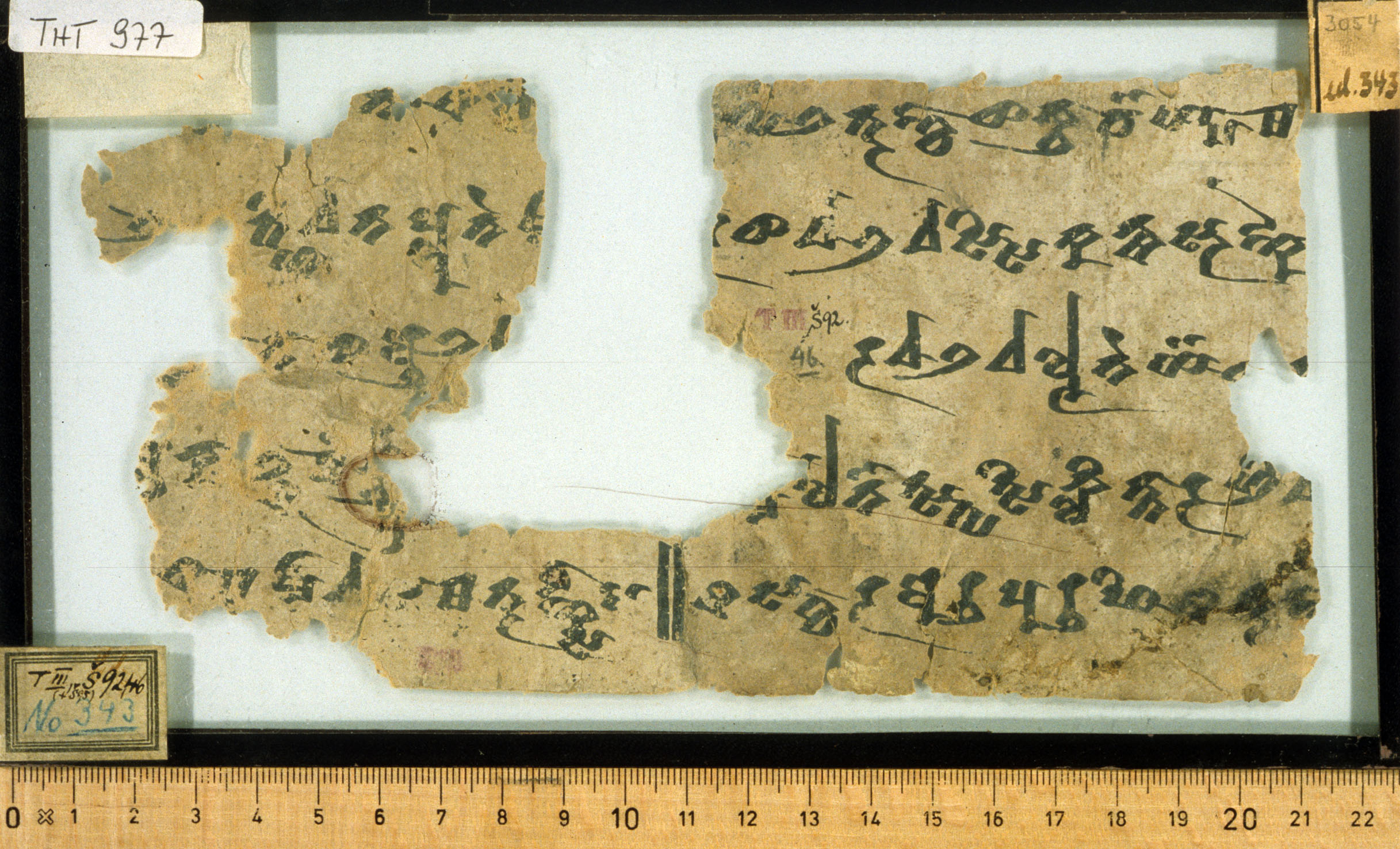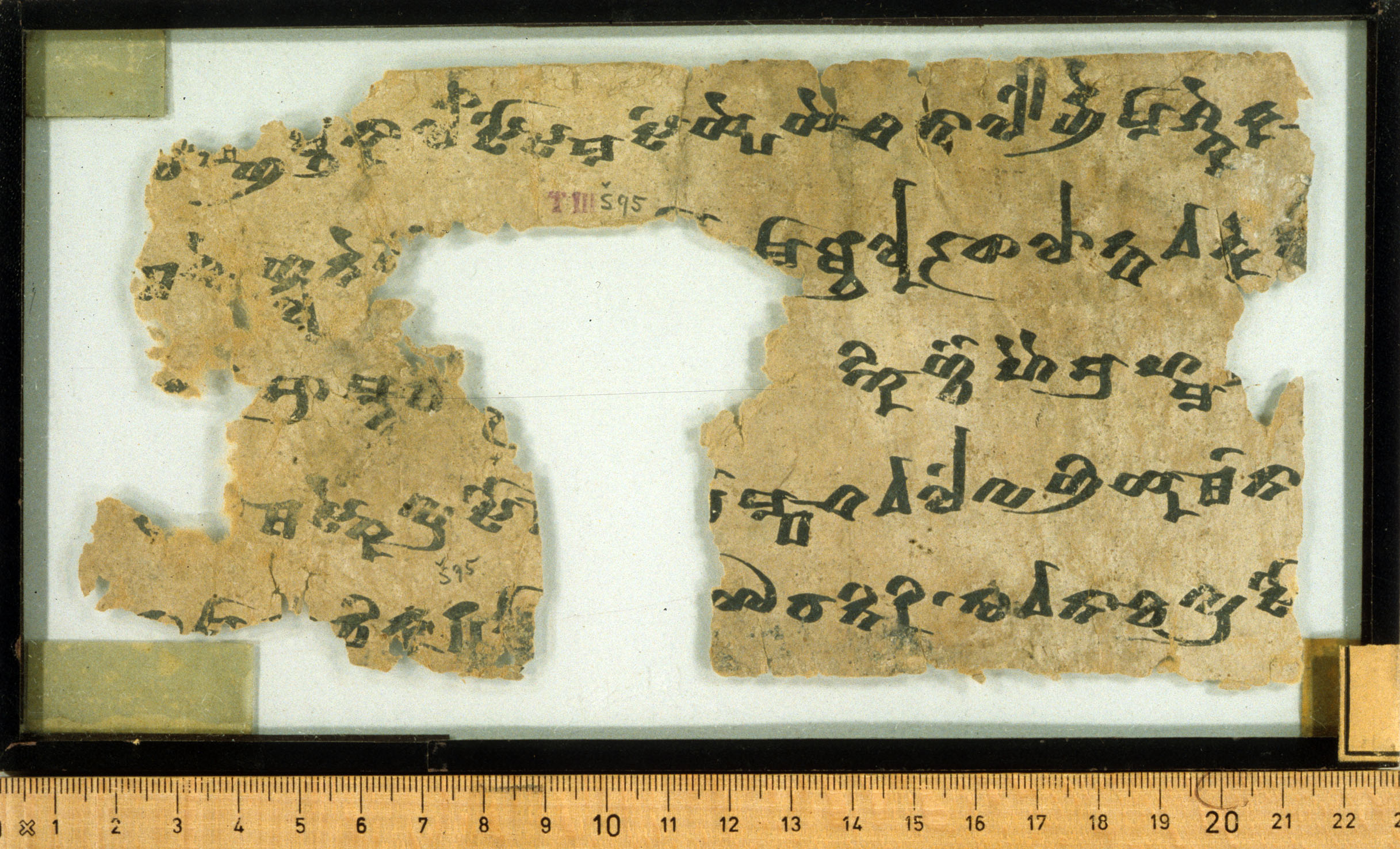A 343
| Known as: | A 343; THT 977 |
|---|---|
| Cite this page as: | Gerd Carling. "A 343". In A Comprehensive Edition of Tocharian Manuscripts (CEToM). Created and maintained by Melanie Malzahn, Martin Braun, Hannes A. Fellner, and Bernhard Koller. https://cetom.univie.ac.at/?m-a343 (accessed 03 Jul. 2025). |
Edition | |
| Editor: | Gerd Carling |
Provenience | |
| Main find spot: | Shorchuk |
| Specific find spot: | Stadthöhle |
| Expedition code: | T III Š 92.46 |
| Collection: | Berlin Turfan Collection |
Language and Script | |
| Language: | TA |
| Script: | classical |
Text contents | |
| Title of the work: | Araṇemijātaka |
| Passage: | b or c |
| Text genre: | Literary |
| Text subgenre: | Jātaka/Avadāna |
| Verse/Prose: | prose; verse |
| Meter: | 43434 (4x) |
Object | |
| Manuscript: | Araṇemi |
| Material: | ink on paper |
| Form: | Poṭhī |
| Number of lines: | 5 |
Images
Images from idp.bl.uk by courtesy of the International Dunhuang Project, the Berlin-Brandenburgische Akademie der Wissenschaften, and the Staatsbibliothek zu Berlin – Orientabteilung.
Transliteration
| a1 | – – – – nā¯ ¯s l· – – – wä¯ ¯l tra ṅka¯ ¯s̝ ku¯ ¯cä ypa¯ ¯m /// |
|---|---|
| a2 | ¯l – tñi e na ṣlu ne mā – – ra s̝a e¯ ¯l e ssi ka tsa sra ṅkā¯ – /// |
| a3 | – – na¯ ¯s̝ ā la – ra e¯ ¯l e lū ne yä[¯] [¯s̝] /// |
| a4 | ā kā lsa¯ ¯m kupre – – – – – ·m· laṃ nä tswa tsi kli nta¯ ¯r ñi [e] /// |
| a5 | – sa¯ ¯m mā e sa¯ ¯m tra ṅksī : 1 || sa ska¯ ¯r a ru pu ru hi[¯] [¯t] tra ṅ·· /// |
| b1 | – [ṣ]ñi ā kā li ssmo saṃ ype ye¯ ¯s tā lo rñe mā śke ka /// |
| b2 | ma we ñlu ne – – – – – – mā ā lu ra¯ ¯s̝ lā nta e rk[a] [t]· /// |
| b3 | – – brā mna¯ ¯cä ·ra ṅki¯ ¯ñcä hai bra hma /// |
| b4 | – – ma skeṃ wra so[¯] [¯m] – – [cä] mpa¯ ¯t e laṃ wa ñi yu¯ ¯m nā /// |
| b5 | – mā – ci ka ry[a] [p]·ā – – – ṇā va ti ri • tu e nā¯ ¯k wra so /// |
Transcription
| a1 | – – – – nās l· – – – wäl träṅkäṣ kuc ypam /// (kuya)¬ |
|---|---|
| a2 | ln1 (pa)t ñi enaṣlune mā (kaś) (to)räṣ{†ä} el essi-k ats{†ä} sräṅkā(t) /// |
| a3 | – – naṣ ālä(ṣtā)r{†ä} el elūneyäṣ /// |
| 1x | 1σ a4n2 ākāl säm ; kupre(ne) (nu) ; (caṣ-äk) (c)m(o)laṃ ; nätswatsi ; klintar-ñi e(l) |
|---|---|
| 1d | /// 9σ (plācäṃ) a5 ; (to)säm mā ; esam träṅksī : 1 ॥ |
| * | {s→r}äskär aru puruhit träṅ(käṣ) /// |
|---|---|
| b1 | – ṣñi ākāliss mosaṃ ypey{e→i}s tālorñe mā śk{e→aṃ} ka(ś) (toräṣ) /// (ca)¬ |
| b2 | m{†ä} weñlune(yäṣ) – – – – mā āluräṣ lānt{†ä} erkat(une) /// |
| b3 | – – brāmnac (t)räṅkiñc hai br{a→ā}hma(ṃ) /// |
| b4 | – (o)mäskeṃ wrasom (mā) (tu) cämpät elaṃ wañiyum nā(täk) /// |
| b5 | – mā (te) ci karya{p→ṣ} (s)ā(s) (aru)ṇāvati ri • tu enāk wraso(m) /// |
Translation
| a1 | ... The king speaks: “What shall I do?” ... |
|---|---|
| a1+ | Or why do you prepare to give gifts ..., not paying attention to my command? ... |
| a3 | ... is, you refrain from giving gifts ... |
| a4 | [is] the wish, even if I should starve to death already in this birth, a gift (?) ... |
| a4+ | Such (speech) I do not offer to say.” |
| a5 | 1. Excited into bitterness, the Purohita says |
| b1 | and for the sake of [your] own desire not caring for the misery of the country ... |
| b1+ | [since] he did not refrain ... (from such) speech [and] (did not care (?) about) the king’s anger... |
| b3 | ... they speak to the Brahmin: “Fie, o Brahmin ... |
| b4 | as a bad person you are not able. The lord is finding pleasure in giving ... |
| b5 | (whether) this town (Aru)ṇāvatī does not deride you. You [are] a mean person ... |
Other
| a1 | What should I do? (Peyrot 2013b: 230) |
|---|---|
| a2 | Or why do you prepare to give gifts …, not paying attention to my command? (Peyrot 2013b: 541) |
Commentary
Remarks
| Transcription and translation are based on Carling et al. 2009. | |
| Transcription and references have been transferred from the "Text and Reference Database of the Tocharian A Language" (Gerd Carling Lund University) (funded by the Bank of Sweden Tercentenary Foundation and SCAS). | |
| This fragment must be placed after A 344 and, according to Sieg 1952: 35-6, before A 342. Schmidt 2001: 305, 308 places A 342 first. |
Parallel texts
| THT 78 |
Philological commentary
| This text contains a conversation and argument between the king and Purohita [Brahmin], who does not share the king’s generosity towards supplicants. In THT 78 the argument between the king and the vidūṣaka [Brahmin] immediately follows the dialogue of the king and the queen, where the king emphasises the fact that he would even give his own life to a supplicant. Thus it makes sense that A 343 should follow THT 78. | |
| In the story as related in this text and the continuing fragment THT 81, there is a gap of unknown length, which may comprise perhaps less than a leaf’s length, but no more than two or three leaves: King Araṇemi drives the Brahmin Rudramukha out of the country before the eyes of his followers – which amounts to a serious insult. Rudramukha betakes himself to a different country where he opens a Brahmin school. All his thoughts and desire are bent on taking revenge on king Araṇemi. | |
| The translation follows Schmidt 2001: 308-9, Sieg 1952: 35 and Carling et al. 2009. | |
| n2 | This line seems to contain a verse of 4x18 syllables, rhythm 7/7/4. |
Linguistic commentary
| n1 | Translation as above Peyrot 2013b: 541. Schmidt 2001: 309, Sieg 1952: 35 and Couvreur 1954b: 261 have more or less “Or why do you not regard my order [and] get excited [about] giving gifts at all?”. Instead of 'you get excited', Couvreur (op. cit.) suggests as alternative 'you continue'. |
|---|
References
Online access
Edition
Sieg and Siegling 1921: 189; Sieg and Siegling 1921 p. 189
Translations
Carling 2000: a4 (12); Hackstein 1995: a3 (214), b2 (214); Knoll 1996: a5 (144); Peyrot 2013b: a1 (230), a2 (541); Sieg 1952: a1 a2 a3 a4 a5 b1 b2 b3 b4 b5 (35); Thomas 1954: a4 (728)
Bibliography
Carling, Gerd. 2000. Die Funktion der lokalen Kasus im Tocharischen. Berlin/New York: de Gruyter.
Carling, Gerd, Georges-Jean Pinault, and Werner Winter. 2009. A dictionary and thesaurus of Tocharian A. Volume 1: Letters a-j. Wiesbaden: Harrassowitz.
Couvreur, Walter. 1954b. “Review of: Übersetzungen aus dem Tocharischen II, aus dem Nachlass hg. v. Werner Thomas.” Orientalische Literaturzeitung 5/6: 259–61.
Hackstein, Olav. 1995. Untersuchungen zu den sigmatischen Präsensstammbildungen des Tocharischen. HS Erg.-Heft 38. Göttingen: Vandenhoeck & Ruprecht.
“The International Dunhuang Project: The Silk Road Online.” n.d. http://idp.bl.uk.
Knoll, Gabriele. 1996. “Die Verwendungsweisen der Adjektive im Tocharischen.” PhD, Universität Frankfurt am Main.
Peyrot, Michaël. 2013b. The Tocharian subjunctive. A study in syntax and verbal stem formation. Vol. 8. Brill’s Studies in Indo-European Languages & Linguistics. Leiden/Boston: Brill.
Schmidt, Klaus T. 2001. “Die westtocharische Version des Araṇemi-Jātakas in deutscher Übersetzung.” In De Dunhuang à Istanbul. Hommage à James Russell Hamilton, edited by Louis Bazin and Peter Zieme, 299–327. Silk Road Studies 5. Turnhout: Brepols.
Sieg, Emil. 1952. Übersetzungen aus dem Tocharischen II, aus dem Nachlass hg. v. Werner Thomas. Abhandl. d. Deutschen Akad. d. Wissenschaften zu Berlin, Kl. f. Sprachen, Literatur und Kunst 1. Berlin: Akademie-Verlag.
Sieg, Emil, and Wilhelm Siegling. 1921. Tocharische Sprachreste, I. Band. Die Texte. A. Transcription. Berlin/Leipzig: de Gruyter.
Sieg, Emil, and Wilhelm Siegling. 1921. Tocharische Sprachreste, I. Band. Die Texte. A. Transcription. Personal annotated copy of Wilhelm Siegling. Scanned by Douglas Q. Adams with the technical assistance of Michael Tarabulski and Kevin Dobbins. Berlin/Leipzig: de Gruyter.
Thomas, Werner. 1954. “Die Infinitive im Tocharischen.” In Asiatica. Festschrift Friedrich Weller. Zum 65. Geburtstag, gewidmet von seinen Freunden, Kollegen und Schülern, edited by Johannes Schubert and Ulrich Schneider, 701–64. Leipzig: Harrassowitz.
Gippert, Jost, Katharina Kupfer, Christiane Schaefer, and Tatsushi Tamai. n.d. “Thesaurus Indogermanischer Text- und Sprachmaterialien (TITUS): Tocharian Manuscripts from the Berlin Turfan Collection.” http://titus.fkidg1.uni-frankfurt.de/texte/tocharic/thtframe.htm.




